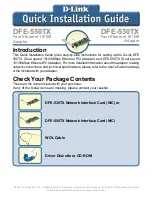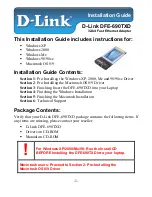
20
Setting the Mode
The PRISM WLAN Interface card can operate in one of two modes, which are specified in the Mode
field of the Configuration menu. Clicking the down arrow at the right of the Mode field displays the
available modes.
802.11 AdHoc Mode
IEEE 802.11, the standard on which the WLAN protocol is based, defines two modes to handle two
separate needs. The first, called AdHoc (or IBSS) mode, is used when two or more wirelessly-
enabled PCs wish to exchange data directly, without an Access Point. In this case the PCs can
establish an AdHoc network in which they are the only members and over which they can exchange
data. To exchange data, each computer participating in the AdHoc network must also specify the
same SSID and AdHoc Channel in this menu.
Infrastructure Mode
The second mode defined by the IEEE 802.11 standard is called infrastructure mode, and is the
primary application for WLAN operation. In this mode all data on the wireless network is directed to an
Access Point, which then routes the data to the appropriate wireless station. The Access Point may
also be configured to allow data to be bridged from the wireless network to wired networks.
To participate in a wireless LAN in infrastructure mode, every station and Access Point must specify
the same SSID. In infrastructure mode, all available channels are scanned for traffic, so there is no
need to specify a channel.
Setting the SSID
The SSID is the Service Set IDentifier used by Access Points and stations to identify a wireless LAN.
Your PRISM WLAN Interface card scans the available channels looking for an Access Point (in
infrastructure mode) or another station (in AdHoc mode) which has specified this same SSID. It then
attempts to associate with these Access Points or stations to form a wireless LAN.
To change the SSID, simply highlight it, type the new SSID, and click the
Apply
button.
In typical infrastructure applications a company will use a single SSID for all Access Points. If the
radio is scanning and cannot find a channel when an Access Point is known to be in range, verify that
the SSID is set correctly.









































